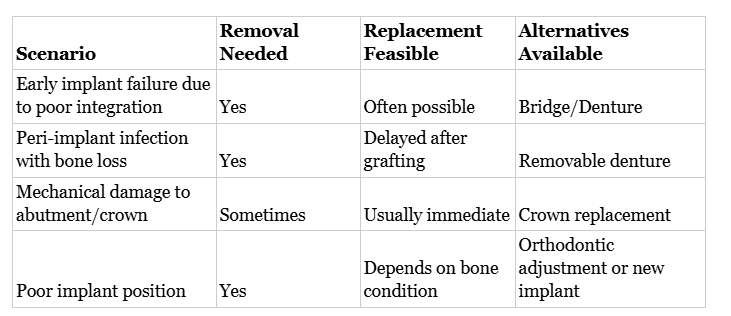Dental implants have become one of the most reliable and long-lasting solutions for people who have lost teeth. They are often chosen as a permanent option, but patients sometimes wonder whether they can be removed and replaced if necessary. While implants are designed to last many years, certain circumstances may lead to the need for replacement. Understanding when and why this might be required is important for anyone considering or currently living with a dental implant.
This blog explains the reasons behind implant removal, the process of replacement, alternatives, and what patients in Leeds can expect if the situation arises.
When Can Dental Implants Be Removed?
Dental implants are embedded securely into the jawbone and intended to act as permanent tooth replacements. However, there are rare situations where removal becomes necessary. The most common reason is implant failure, which can occur either shortly after placement or several years later. Early failure is usually linked to poor integration with the bone, while late failure might result from infection or other complications.
Infections like peri-implantitis, which closely resemble gum disease, can slowly damage the surrounding bone and tissue. When detected early, they can sometimes be managed with treatment. But if the condition progresses, it may lead to implant instability requiring removal. Mechanical issues with the implant components, such as damage to the crown, abutment, or screw, can also necessitate replacement.
How Are Dental Implants Removed?
The process of removing a dental implant Leeds patients may require is more delicate than placing it, as the aim is to preserve as much surrounding bone as possible. A skilled dentist or oral surgeon carefully works to release the implant from the jawbone while ensuring minimal damage. In most cases, the procedure is carried out using advanced tools and techniques under local anaesthesia, so patients feel comfortable throughout.
If the bone has grown densely around the implant, removal can be more complex. In such cases, a section of bone may need to be removed during the procedure. After extraction, patients may be guided towards bone grafting to restore strength before a new implant can be placed later.
Can Implants Be Replaced Immediately?
Whether an implant can be replaced straight away depends on several factors. The main considerations are the health of the bone and gums, and the reason for removal. If infection or significant bone loss played a role, immediate replacement could compromise the result. Instead, bone regeneration treatments may be recommended before inserting a new implant.
If the reason for removal was mechanical damage or failure to integrate with the bone, immediate replacement may be possible. This decision is made after a thorough examination, often involving advanced diagnostic imaging to assess bone density and structure.
Key Benefits of Removing and Replacing an Implant
When replacement is appropriate, patients can look forward to renewed comfort and restored aesthetics. Factors such as new implant technology and updated imaging systems can improve outcomes considerably compared to older treatments. Here are three major benefits:
- Improved Aesthetics: Replacement often uses advanced materials designed to mimic natural tooth structure better.
- Enhanced Comfort: A properly placed new implant eliminates the discomfort linked to a failing or misaligned implant.
- Restored Confidence: Patients regain the stability, chewing efficiency, and smile appearance they may have lost.
Risks and Considerations
Like any dental procedure, removal and replacement involve certain risks. These include potential bone loss, infection during healing, and challenges in achieving proper integration of the new implant. People who smoke, have uncontrolled diabetes, or poor oral hygiene are at greater risk of implant failure.
Your dentist will conduct a thorough clinical and radiological assessment before suggesting removal or replacement. It is common to explore supporting measures like bone grafts or sinus lifts to improve the success rate. Advancements in implant materials and surface technology also continue to increase longevity and reduce risks. For those who experience sudden complications, contacting an emergency dentist in Leeds quickly is crucial for preserving oral health.
Alternatives to Replacing Dental Implants
Although replacing failed implants is often the preferred approach, there are alternative treatments. Bridges or dentures may be suggested if the patient’s jawbone is not suitable for another implant. For some, this may be a temporary solution while undergoing bone grafting or regenerative treatments, whereas others may opt for these as permanent options.
A detailed consultation helps determine which option aligns best with personal expectations, oral health needs, and financial considerations.
Comparing Removal and Replacement Options
To understand the possibilities more clearly, it is helpful to compare removal and replacement scenarios:

This table highlights the careful assessment that guides whether replacement can be immediate or delayed.
When to See an Emergency Dentist
Implant failure is usually slow to develop, but sudden complications can sometimes occur. A loosened implant, acute pain, swelling, or uncontrolled bleeding requires urgent dental attention. An emergency dentist in Leeds can provide immediate relief and prevent further complications that might affect oral health long-term. Timely intervention is an essential part of preserving treatment outcomes.

Long-Term Success with Implants
Modern dental implants boast incredibly high success rates, often exceeding 95 per cent when placed under the right conditions. Good oral hygiene, regular follow-ups, and lifestyle choices all play a role in maintaining them. Proper care, including daily cleaning and professional check-ups, helps avoid complications such as gum disease or infection that may threaten implant longevity.
Patients in Leeds who are considering treatment or experiencing concerns will benefit from thorough professional support. Choosing an experienced dentist for both implant placements and replacements is vital for securing positive long-term results.
Video Link : https://vimeo.com/1063039683/08abd3f218?share=copy
Conclusion
Dental implants are widely regarded as a durable and highly effective solution for tooth loss. While they are designed to last for decades, situations may occasionally call for removal and replacement. Whether due to infection, bone loss, or mechanical problems, advancements in modern dentistry ensure reliable solutions are always available. For professional, personalised advice and support, the team at EDL is here to guide you every step of the way.


